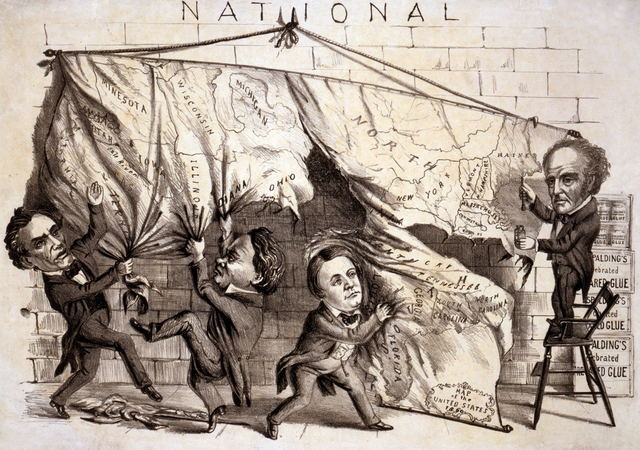To win, the Right must distinguish anti-Americanism from anti-racism.
How to “Defend America”

Three keys to attainable victory.
The recent essay by Ryan P. Williams is an inspiring launch document for the “Defend America” campaign. Public replies so far have focused on whether multiculturalism is the appropriate adversary, but I’d like to zoom out and offer three suggestions for promoting the overall success of the initiative. The first is conceptual, the second strategic, the third territorial.
Strengthen the core framework, particularly Americanism
The first suggestion is to strengthen alignment around the core framework, particularly the meaning of Americanism. Williams, in his essay, frames the challenge as a contest between Americanism and multiculturalism. “Americanism vs Multiculturalism” is a powerful dialectic frame that works memetically. With deeper conceptual alignment, it could be an asset to the effort.
David Marcus, in a response in the Federalist, argues we should be fighting “progressivism,” not multiculturalism. He emphasizes that the problem isn’t caused by culture or outsiders but by a progressive ideology that’s developed mostly from within America. While Marcus makes some good points, the dispute on this side of the framework seems mostly semantic. Williams and Marcus are aligned on what the enemy ideology is, just not sure what to call it.
Although the term multiculturalism has a Dinesh-in-the-‘90s vibe, I believe Williams is correct to revive it. His core conceptualization shows great clarity: “Identity politics is the coalitional strategy of multiculturalism and political correctness its enforcement arm,” he writes. In any case, progressivism sounds too friendly, and other alternatives like communism and globalism have their own shortcomings. Insofar as the issue is semantic, John Daniel Davidson is correct to caution against getting bogged down on terminology. Multiculturalism works for now. See what sticks.
The deeper misalignment is around the meaning of Americanism. Marcus pokes at this in his response. Marcus argues that pluralism and freedom are the cornerstones of Americanism. He pushes back on any emphasis on assimilation or patriotism. Davidson, in his response to Marcus, suggests that Marcus misunderstood what Williams meant by assimilation—that Williams emphasized assimilating to “a certain view of justice embodied in the Declaration of Independence” rather than to a specific culture.
Davidson’s reply doesn’t seem accurate. This is probably because Williams, in defining Americanism, isn’t very clear. One the one hand Williams defines Americanism around the founders’ view of justice—an idea. But then he writes: “America is more than an idea—it is a people and a country.” Well, which is it? Williams seems to want a fusion of “civil nationalism with the popular, cultural, and historical touchstones of American greatness.” Whereas Marcus divorces Americanism from Trumpism, Williams conflates them. Are Williams and Marcus really on the same side?
To wage this campaign, we need a clearer view of what we mean by Americanism, and a more aligned coalition behind the campaign. My sense is that this will call for a deeper exploration of American identity and new fusions of ideas about what it means. Perhaps we will need to embrace that Americanism is both a creed and a people.
Approach this strategically, with fighting spirit
The second suggestion for winning is to promote strategic thought on how to succeed in this challenge, along with a sense of maneuver.
My first reaction to the essay, candidly, was to wonder where the American Right has been for the last 20 years. As many readers will recall, multiculturalism was a watchword in 1990s campus politics. Multiculturalism was the named, enemy ideology on campus. Although the term has lost favor, the last two decades have seen it spread from campus to, well, everywhere. Today, even Wall Street is woke.
How did this happen? What allowed multiculturalism to spread so widely over the last two decades? How did we go from campus craziness in the ‘90s to drag queen story hour at the local library? More importantly, why was the American Right so ineffective in stopping it?
A deeper exploration of these questions is essential to developing a strategy to defeat multiculturalism. And develop a strategy we must. This will call for a stronger situation analysis, a deeper sense of how change happens, and an actionable and adaptable plan to win. I’d like to see us draw from different types of thinking — from McKinsey to political warfare strategy — married with a sense of maneuver.
Likewise, we need refined and updated messaging tailored to today’s challenges. For example, presenting ourselves as “not seeing color” and opposing all identity politics, as many conservatives have in recent decades, strikes me as dumb, unrealistic, and counterproductive. Today’s challenge is to reorient, not eradicate, our relationship with identity. We shouldn’t fall back on ‘90s meanings and surface-level understandings. (Eric Kaufmann’s recent essay is a great move in this direction.)
One thing seems certain: whatever the American Right has done over the last two decades hasn’t worked. Internalizing the need for new approaches is key. I mean, do people actually want to win? If so, “Defend America” needs to embrace strategic, not just philosophical, thinking — with fighting spirit.
Pay attention to the global information battle
My third and final suggestion is pay attention to the global information battle. As some of you may know, I’ve spoken and written extensively about “memetic warfare” and the information environment. I see us entering an era of intense ideological warfare that’s global, nonlinear (from all directions), and highly participatory. Think of it as a memetic clash of civilizations playing out all around us.
Today’s most important battles are over the territory where ideas spread: Google algorithms, Twitter deplatforming rules, Facebook and Amazon policies. The decisions of global platforms and services will have a profound impact on our ability to share, spread, and source ideas. We must fight this ground war for free exchange even as we pursue the broader dialogue. (We saw the need for this firsthand when Google initially rejected ads promoting this initiative!)
This territory is global, just as the struggle against ideological multiculturalism is global. While this campaign focuses on America, its impact will be felt across Western democracies and the world. The risk isn’t just that America becomes a one-party system, but that the world does. We must appreciate the global context of this political and ideological battle.
The stakes are high for “Defend America.” It’s an effort worthy of passionate support.
The American Mind presents a range of perspectives. Views are writers’ own and do not necessarily represent those of The Claremont Institute.
The American Mind is a publication of the Claremont Institute, a non-profit 501(c)(3) organization, dedicated to restoring the principles of the American Founding to their rightful, preeminent authority in our national life. Interested in supporting our work? Gifts to the Claremont Institute are tax-deductible.
Militant evangelists for ruling-class values rotted our foreign policy out from the inside.
Today’s fraudulent multiculturalist faith fragments society—and fractures the psyche.
The multiculturalists know who they are and what they want. Do We?
Its ideologues are careful to conceal their transformation of higher education into an anti-Western, post-American seminary.
The progressive Left's cluster of demands is an ideological deformity, not a comprehensive doctrine.






